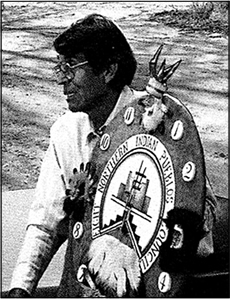Santa Fe Living Treasures – Elder Stories
<<Back to Treasures Index
Herman | Herman AgoyoI think being involved in sports opened a lot of doors--to education--to recognition--to travel," said Herman Agoyo of San Juan Pueblo. "My dream was to play professional baseball." Born at the Santa Fe Indian Hospital in 1934, Herman grew up with his "grandpa and Aunt Juanita." He had "no education and didn't really promote education" because the mindset of the times was that Indians should learn a vocational skill. "That was drilled into the system at Santa Fe Indian School, too, because educators basically all the way from Washington on down saw the Indian people as being good with their hands. There was an emphasis on art and various vocational trades." But Herman had other ideas. In the 1950s, the teachers at the Santa Fe Indian School didn't encourage students to go to college, he said. "By the time you reached ninth grade, you had to make a choice of what vocation you were going to specialize in. Some of us weren't interested in that. We wanted to go to college.... As I look back, I'm very grateful that the principal and some of the teachers listened to what we were saying. We asked for chemistry, foreign language, and typing." When Herman was in ninth grade, he met Father Joel Byrne. After Father Joel was transferred to New Orleans, he continued to correspond with Herman, and recommended that he attend Manhattan College. Herman packed his bags for New York City--the only student from his fifty-four-member class at Santa Fe Indian School to go directly to a four-year college. He graduated from Manhattan College in 1958. "I've been involved in earning a living in Indian affairs since 1965," Herman said. "It was the dream of Kennedy, but after his death it was President Johnson who implemented what we now know as the Great Society programs and the War on Poverty. Arizona State [University] got a contract to hire people like me to go into the Indian communities to tell them about the law and how to start community action programs. That was my job. Up to that point the only government agency we had dealt with was the Bureau of Indian Affairs. This opened the door to work with all federal agencies, which we are doing today." Herman has served in many capacities in tribal and intertribal government. He became executive director of the Eight Northern Indian Pueblos Council at San Juan Pueblo but resigned in 1980 to take on the responsibility of coordinating the commemoration of the three hundredth anniversary of the 1680 Pueblo Revolt. "It was especially important to me because the principal leader of the revolt, Pop, was from San Juan Pueblo," Herman said. Please see Volume 1 for complete text. |

